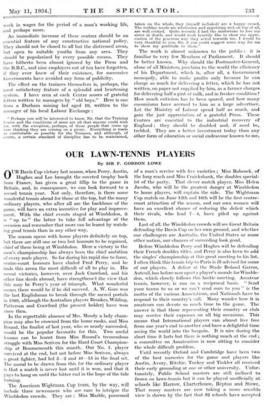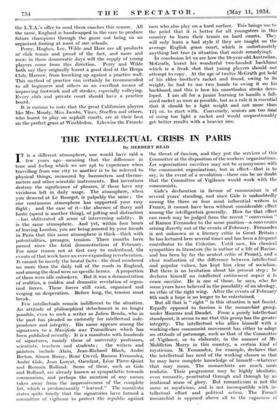OUR LAWN-TENNIS PLAYERS
By SIR F. GORDON LOWE
OUR Davis Cup victory last season, when Perry, Austin, Hughes and Lee brought the coveted trophy back from France, has given a great fillip to the game in Britain, and, in consequence, we can look forward to a record tennis year. Not only, therefore, is there some wonderful tennis ahead for those at the top, but the many ordinary players, who after all are the backbone of the game, will have an extra incentive for play and improve- ment. With the chief events staged at Wimbledon, it is " up to " the latter to take full advantage of the occasion and remember that more can be learnt by watch- ing good tennis than in any other way.
The season opens with home players definitely on top, but there are still one or two lost honours to be regained, chief of these being at Wimbledon. Here a victory in the men's championship has always been the chief ambition of every male player. So far during his rapid rise to fame, centre-court honours have eluded Fred Perry, and he finds this arena the most difficult of all to play in. His recent victories, however, over Jack Crawford, and his other fine deeds abroad, have strengthened the view that this may be Perry's year of triumph. What wonderful scenes there would be if he did succeed. A. W. Gore was the last Englishman to break through the sacred portals in 1909, although the Australian players Brookes, Wilding, Patterson and Crawford (the present holder) have won since then.
In the regrettable absence of Mrs. Moody a lady cham- pion may also be crowned from the home ranks, and Miss Round, the finalist of last year, who so nearly succeeded, would be the popular favourite for this. Two useful lessons can be learnt from Miss Round's tremendous struggle with Miss Scriven for the Hard Court Champion- ship at Bournemouth this month. Our No. 1. player survived at the end, but not before Miss Scriven, always a great fighter, had led 5-2 and 40-15 in the final set. The moral to be drawn from this for the ordinary player is that a match is never lost until it is won, and that it pays to hang on until the bitter end in the hope of the tide turning. The American Wightman Cup team, by the way, will include three newcomers who are sure to intrigue the Wimbledon crowds. They are : Miss Marble, possessed of a man's service with five varieties ; Miss Babcock, of the long reach and Miss Cruickshank, the doubles special- ist of the party. That clever match player, Miss Helen Jacobs, who will be the greatest danger at Wimbledon to home players, will captain the side. The Wightman Cup match on June 15th and 16th will be the first centre- court attraction of the season, and our own women will have an excellent chance of reducing the deficit which their rivals, who lead 7-4, have piled up against them.
Last of all, the Wimbledon crowds will see Great Britain defending the Davis Cup on her own ground, and whether our challengers are Australia, the United States or some other nation, our chances of succeeding look good.
Before Wimbledon Perry and Hughes will be defending their French doubles titles, and Perry is also keen to add the singles' championship at this great meeting to his list. I often think this tennis trip to Paris is ill-advised for some of our players. A defeat at the Stade Roland Garros, Auteuil, has before now upset a player's morale for Wimble- don, which closely follows this hectic meeting. Amateur tennis, however, is run on a reciprocal basis. " Send your teams to us or we can't send ours to you " is the motto of the various Associations, and Nationals have to respond to their country's call. Many wonder how it is amateurs can devote so much time to the game. The answer is that those representing their country or club may receive their expenses on all big occasions. This means that International players can almost live free from one year's end to another and have a delightful time seeing the world into the bargain. It is nice during the short time it lasts but there is nothing much at the end ; a committee on Amateurism is now sitting to consider the whole difficult problem.
Until recently Oxford and Cambridge have been two of the best nurseries for the game and players like Austin, Avory, Ritchie, Tuckey and Tinkler all received their early grounding at one or other university. Unfor- tunately, Public School masters are still inclined to frown on lawn-tennis but it can be played unofficially at schools like Harrow, Charterhouse, Repton and Stowe. That many masters are now taking a more sensible view is shown by the fact that 82 schools have accepted the L.T.A.'s offer to send them coaches this season. All the same, England is handicapped in the race to produce future champions through the game not being on an organized footing at most of our schools.
Perry, Hughes, Lee, Wilde and Hare are all products of club tennis and proud of the fact, and more and more in these democratic days will the supply of young players come from this direction. Perry and Wilde both say they originally learnt a good deal at the Herga Club, Harrow, from knocking up against a practice wall. This method of practice can certainly be recommended to all beginners and others as an excellent means of improving footwork and all strokes, especially volleying. Every club and private court should have a practice board.
It is curious to note that the great Californian players like Mrs. Moody, Miss Jacobs, Vines, Stoeffen and others, who learnt to play on asphalt courts, are at their best on the perfect grass at Wimbledon. Likewise the French- men who also play on a hard surface. This brings me to the point that it is better for all youngsters in this country to learn their tennis on hard courts. They will only learn a bad style if they are taught on the average English grass court, which is unfortunately anything but true (a situation that needs remedying).
In conclusion let us see how the 19-year-old Australian, McGrath, learnt his wonderful two-handed backhand which is a freak shot that young players should not attempt to copy. At the age of twelve McGrath got hold of his elder brother's racket and found, owing to its weight, he had to use two hands to swing it on his backhand, and this is how his unorthodox stroke deve- loped. I am all for a junior learning to handle a full- sized racket as soon as possible, but as a rule it is essential that it should be a light weight and not more than 127 oz. to start with. Conversely, seniors are too fond of using too light a racket and would unquestionably get better results with a heavier one.









































 Previous page
Previous page